- Home
- Tony Hillerman
The Fallen Man
The Fallen Man Read online
TONY
HILLERMAN
This book is dedicated to members of the Dick Pfaff Philosophical Group, which for the past quarter-
century has gathered each Tuesday evening to test the laws of probability and sometimes, alas, the Chaos
Theory.
Contents
HarperCollins e-book exclusive extras:
Leaphorn, Chee, and the Navajo Way
The Novels, As Annotated by T.H.
Tony Hillerman on...
Skinwalkers Becomes a MYSTERY!
Profile of the Navajo Nation
Chapters:
Chapter 1
Chapter 2
Chapter 3
Chapter 4
Chapter 5
Chapter 6
Chapter 7
Chapter 8
Chapter 9
Chapter 10
Chapter 11
Chapter 12
Chapter 13
Chapter 14
Chapter 15
Chapter 16
Chapter 17
Chapter 18
Chapter 19
Chapter 20
Chapter 21
Chapter 22
Chapter 23
Chapter 24
Chapter 25
Chapter 26
Chapter 27
Acknowledgments
About the Author
Books by Tony Hillerman
Credits
Copyright
About the Publisher
FROM WHERE BAI BUCHANAN SAT with his back resting against the rough breccia, he could see the side of Whiteside’s head, about three feet away. When John leaned back, Buchanan could see the snowcapped top of Mount Taylor looming over Grants, New Mexico, about eighty miles to the east. Now John was leaning forward, talking.
“This climbing down to climb back up, and climbing up so you can climb back down again,” Whiteside said. “That seems like a poor way to get the job done. Maybe it’s the only way to get to the summit, but I’ll bet we could find a faster way down.”
“Relax,” Buchanan said. “Be calm. We’re supposed to be resting.”
They were perched on one of the few relatively flat outcrops of basalt in what climbers of Ship Rock call Rappel Gully. On the way up, it was the launching point for the final hard climb to the summit, a slightly tilted but flat surface of basalt about the size of a desktop and 1,721 feet above the prairie below. If you were going down, it was where you began a shorter but even harder almost vertical climb to reach the slope that led you downward with a fair chance of not killing yourself.
Buchanan, Whiteside, and Jim Stapp had just been to the summit. They had opened the army surplus ammo box that held the Ship Rock climbers’ register and signed it, certifying their conquest of one of North America’s hard ones. Buchanan was tired. He was thinking that he was getting too old for this.
Whiteside was removing his climbing harness, laying aside the nylon belt and the assortment of pitons, jumars, etriers, and carabiners that make reaching such mountaintops possible.
He did a deep knee bend, touched his toes, and stretched. Buchanan watched, uneasy.
“What are you doing?”
“Nothing,” Whiteside said. “Actually, I’m following the instructions of that rock climber’s guide you’re always threatening to write. I am getting rid of all nonessential weight before making an unprotected traverse.”
Buchanan sat up. He played in a poker game in which Whiteside was called “Two-Dollar John” because of his unshakable faith that the dealer would give him the fifth heart if he needed one. Whiteside enjoyed taking risks.
“Traversing what?” Buchanan asked.
“I’m just going to ease over there and take a look.” He pointed along the face of the cliff. “Get out there maybe a hundred feet and you can see down under the overhang and into the honeycomb formations. I can’t believe there’s not some way to rappel right on down.”
“You’re looking for some way to kill yourself,” Buchanan said. “If you’re in such a damn hurry to get down, get yourself a parachute.”
“Rappelling down is easier than up,” Whiteside said. He pointed across the little basin to where Stapp was preparing to begin hauling himself up the basalt wall behind them. “I’ll just be a few minutes.” He began moving with gingerly care out onto the cliff face.
Buchanan was on his feet. “Come on, John! That’s too damn risky.”
“Not really,” Whiteside said. “I’m just going out far enough to see past the overhang. Just a peek at what it looks like. Is it all this broken-up breccia or is there, maybe, a big old finger of basalt sticking up that we could scramble right on down?”
Buchanan slid along the wall, getting closer, admiring Whiteside’s technique if not his judgment. The man was moving slowly along the cliff, body almost perfectly vertical, his toes holding his weight on perhaps an inch of sloping stone, his fingers finding the cracks, crevices, and rough spots that would help him keep his balance if the wind gusted. He was doing the traverse perfectly. Beautiful to watch. Even the body was perfect for the purpose. A little smaller and slimmer than Buchanan’s. Just bone, sinew, and muscle, without an ounce of surplus weight, moving like an insect against the cracked basalt wall.
And a thousand feet below him—no, a quarter of a mile below him lay what Stapp liked to call “the surface of the world.” Buchanan looked out at it. Almost directly below, two Navajos on horseback were riding along the base of the monolith—tiny figures that put the risk of what Whiteside was doing into terrifying perspective. If he slipped, Whiteside would die, but not for a while. It would take time for a body to drop six hundred feet, then to bounce from an outcrop, and fall again, and bounce and fall, until it finally rested among the boulders at the bottom of this strange old volcanic core.
Buchanan looked away from the riders and from the thought. It was early afternoon, but the autumn sun was far to the north and the shadow of Ship Rock already stretched southeastward for miles across the tan prairie. Winter would soon end the climbing season. The sun was already so low that it reflected only from the very tip of Mount Taylor. Eighty miles to the north early snows had already packed the higher peaks in Colorado’s San Juans. Not a cloud anywhere. The sky was a deep dry-country blue; the air was cool and, a rarity at this altitude, utterly still.
The silence was so absolute that Buchanan could hear the faint sibilance of Whiteside’s soft rubber shoe sole as he shifted a foot along the stone. A couple of hundred feet below him, a red-tailed hawk drifted along, riding an updraft of air along the cliff face. From behind him came the click of Stapp fastening his rappelling gear.
This is why I climb, Buchanan thought. To get so far away from Stapp’s “surface of the earth” that I can’t even hear it. But Whiteside climbs for the thrill of challenging death. And now he’s out about thirty yards. It’s just too damn risky.
“That’s far enough, John,” Buchanan said. “Don’t press your luck.”
“Two more feet to a handhold,” Whiteside said. “Then I can take a look.”
He moved. And stopped. And looked down.
“There’s more of that honeycomb breccia under the overhang,” he said, and shifted his weight to allow a better head position. “Lot of those little erosion cavities, and it looks like some pretty good cracking where you can see the basalt.” He shifted again. “And a pretty good shelf down about—”
Silence. Then Whiteside said, “I think I see a helmet.”
“What?”
“My God!” Whiteside said. “There’s a skull in it.”
THE WHITE PORSCHE LOOMING in the rearview mirror of his pickup distracted Jim Chee from his gloomy thoughts. Chee had been rolling southward down Highway 666 toward Salt C
reek Wash at about sixty-five miles per hour, which was somewhat more than the law he was paid to uphold allowed. But Navajo Tribal Police protocol this season was permitting speeders about that much margin of error. Besides, traffic was very light, it was past quitting time (the mid-November sunset was turning the clouds over the Carrizo Mountains a gaudy pink), and he saved both gasoline and wear on the pickup’s tired old engine by letting it accelerate downhill, thereby gathering momentum for the long climb over the hump between the wash and Shiprock.
But the driver of the Porsche was making a lot more than a tolerable mistake. He was doing about ninety-five. Chee picked the portable linker light off the passenger-side floorboard, switched it on, rolled down the window, and slapped its magnets against the pickup roof. Just as the Porsche whipped past.
He was instantly engulfed in cold air and road dust. He rolled up the window and jammed his foot down on the accelerator. The speedometer needle reached 70 as he crossed Salt Creek Wash, crept up to almost 75, and then wavered back to 72 as the upslope gravity and engine fatigue took their toll. The Porsche was almost a mile up the hill by now. Chee reached for the mike, clicked it on, and got the Shiprock dispatcher.
“Shiprock,” the voice said. “Go ahead, Jim.”
This would be Alice Notabah, the veteran. The other dispatcher, who was young and almost as new on the job as was Chee, always called him Lieutenant.
“Go ahead,” Alice repeated, sounding slightly impatient.
“Just a speeder,” Chee said. “White Porsche Targa, Utah tags, south on triple six into Shiprock. No big deal.” The driver probably hadn’t seen his blinker. No reason to look in your rearview when you pass a rusty pickup. Still, it added another minor frustration to the day’s harvest. Trying to chase the sports car would have been simply humiliating.
“Ten four,” Alice said. “You coming in?”
“Going home,” Chee said.
“Lieutenant Leaphorn was in looking for you,” Alice said.
“What’d he want?” It was actually former lieutenant Leaphorn now. The old man had retired last summer. Finally. After about a century. Still, retired or not, hearing that Leaphorn was looking for him made Chee feel uneasy and begin examining his conscience. He’d spent too many years working for the man.
“He just said he’d catch you later,” Alice said. “You sound like you had a bad day.”
“Just a total blank,” Chee agreed. But that wasn’t accurate. It was worse than blank. First there had been the episode with the kid in the Ute Mountain Tribal Police uniform (Chee balked at thinking of him as a policeman), and then there was Mrs. Twosalt.
Cocky kid. Chee had been parked high on the slope below Popping Rock where his truck was screened from view by brush and he had a long view of the oil field roads below. He’d been watching a mud-spattered blue two-ton GMC pickup parked at a cattle guard about a mile below him. Chee had dug out his binoculars and focused them, and was trying to determine why the driver had parked there and if anyone was sitting on the passenger’s side. All he was seeing was dirt on the windshield.
About then the kid had said “Hey!” in a loud voice, and when Chee had turned, there he was, about six feet away, staring at him through dark and shiny sunglasses.
“What’s you doing?” the kid had asked, and Chee had recognized that he was wearing what looked like a brand-new Ute Mountain Tribal Police uniform.
“I’m watching birds,” Chee said, and tapped the binoculars.
Which the kid hadn’t found amusing.
“Let’s see some identification,” he’d said. That was all right with Chee. It was proper procedure when you run across something that maybe looks suspicious. He’d fished out his Navajo Tribal Police identification folder, wishing he hadn’t made the smart-aleck remark about bird-watching. It was just the sort of wisecrack cops heard every day and resented. He wouldn’t have done it, he thought, if the kid hadn’t sneaked up on him so efficiently. That was embarrassing.
The kid looked at the folder, from Chee’s photograph to Chee’s face. Neither seemed to please him.
“Navajo police?” he’d said. “What’s you doing out here on the Ute reservation?”
And then Chee politely explained to the kid that they weren’t on the Ute reservation. They were on Navajo land, the border being maybe a half mile or so east of them. And the kid had sort of smirked and said Chee was lost, the border was at least a mile the other way, and he’d pointed down the slope. The argument that might have started would have been totally pointless, so Chee had said good-bye and climbed back into his truck. He had driven away, thoroughly pissed off, remembering that the Utes were the enemy in a lot of Navajo mythology and understanding why. He was also thinking he had handled that encounter very poorly for an acting lieutenant, which he had been now for almost three weeks. And that led him to think of Janet Pete, who was why he’d worked for this promotion. Thinking of Janet always cheered him up a little. The day would surely get better.
It didn’t. Next came Old Lady Twosalt.
Just like the Ute cop, she’d walked right up behind him without him hearing a thing. She caught him standing in the door of the school bus parked beside the Twosalt hogan, and there wasn’t a damn thing he could do but continue standing there, stammering and stuttering, explaining that he’d honked his horn, and waited around and hollered, and did all the polite things one does to protect another’s privacy when one visits a house in mostly empty country. And then he’d finally decided that nobody was home. Finally, too, he stopped talking.
Mrs. Twosalt had just stood there, looking politely away from him while he talked instead of looking into his eyes—which is the traditional Navajo way of suggesting disbelief. And when he’d finally finished, she went right to the heart of it.
“I was out looking after the goats,” she said. “But what are you looking for in my school bus? You think you lost something in there, or what?”
What Chee was looking for in the school bus was some trace of cow manure, or cow hair, or wool, or any other evidence that the vehicle had been used to haul animals other than schoolkids. It involved the same problem that had him peering through his binoculars at the big pickup over by Popping Rock. Cattle were disappearing from grazing land in the jurisdiction of the Shiprock agency, and Captain Largo had made stopping this thievery the first priority of Chee’s criminal investigation division. He put it ahead of dope dealing at the junior college, a gang shooting, bootlegging, and other crimes that Chee felt were more interesting.
He’d rolled out of the cot in his trailer house in the cold dawn this morning, put on his jeans and work jacket, and fired up the old truck intending to spend the day incognito, just prowling around looking for the kind of vehicles into which those cattle might be disappearing.
The GMC pickup was a natural. It was a fifth-wheel model designed to pull heavy trailers and known to be favored by serious rustlers who like to do their stealing in wholesale, trailer-load lots. But he’d just happened to notice the school bus while jolting down the trail from Popping Rock, and just happened to remember the Twosalt outfit not only raised cattle but had a shaky reputation, and just happened to wonder what they would want with an old school bus anyway. None of that helped him come up with the answer for which Mrs. Twosalt had stood there waiting.
“I was just curious,” Chee said. “I used to ride one of these things to school when I was a kid. I was wondering if they’d changed them any.” He produced a weak laugh.
Mrs. Twosalt hadn’t seemed to share his amusement. She waited, looked at him, waited some more—giving him a chance to change his story and to offer a more plausible explanation for this visit.
In default of a better idea, Chee had fished out his identification folder. He’d said he’d come by to learn if the Twosalts were missing any cattle or sheep or had seen anything suspicious. Mrs. Twosalt said she kept good track of all their animals. Nothing was missing. And that had been the end of that except for the lingering embarrassment.
It was almost dark as he topped the hill and looked down at the scattering of lights of Shiprock town. No sign of the Porsche. Chee yawned. What a day! He turned off the pavement onto the gravel road, which led to the dirt road, which led to the weedy track down to his trailer under the cottonwoods beside the San Juan River. He rubbed his eyes, yawned again. He’d warm up what was left of his breakfast coffee, open a can of chili, and hit the sack early. A bad day, but now it was over.
No, it wasn’t. His headlights reflected off a windshield, off a dusty car parked just past his trailer. Chee recognized it. Former lieutenant Joe Leaphorn, as promised, had caught him later.
CHEE’S TRAILER HAD BEEN CHILLY when he left it at dawn. Now it was frigid, having leaked what little warmth it had retained into the chill that settled along the San Juan River. Chee lit the propane heater and started the coffee.
Joe Leaphorn was sitting stiff and straight on the bench behind the table. He put his hat on the Formica tabletop and rubbed his hand through his old-fashioned crew cut, which had become appropriately gray. Then he replaced the hat, looked uneasy, and took it off again. To Chee the hat looked as weatherworn as its owner.
“I hate to bother you like this,” Leaphorn said, and paused. “By the way, congratulations on the promotion.”
“Thanks,” Chee said. He glanced around from the coffeepot, where the hot water was still dripping through the grounds, and hesitated. But what the hell. It had not seemed plausible when he’d heard it, but why not find out?
“People tell me you recommended me for it.”
If Leaphorn heard that, it didn’t show on his face. He was watching his folded hands, the thumbs of which he had engaged in circling each other.
“It gets you lots of work and worry,” Leaphorn said, “and not much pay goes with the job.”
Chee extracted two mugs from the cabinet, put the one advertising the Farmington Times in front of Leaphorn, and looked for the sugar bowl.
“How you enjoying your retirement?” Chee asked. Which was a sort of oblique way of getting the man to the point of this visit. This wouldn’t be a social call. No way. Leaphorn had always been the boss and Chee had been the gofer. One way or another this visit would involve law enforcement and something Leaphorn wanted Chee to do about it.

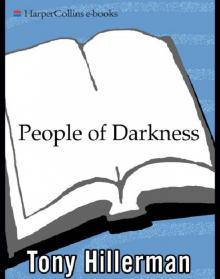 People of Darkness
People of Darkness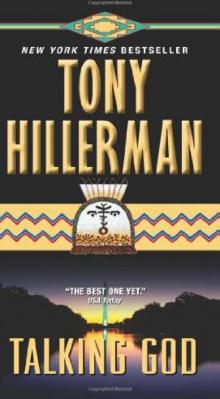 Talking God jlajc-9
Talking God jlajc-9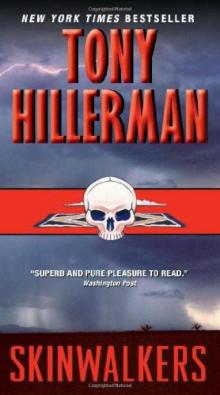 Skinwalkers jlajc-7
Skinwalkers jlajc-7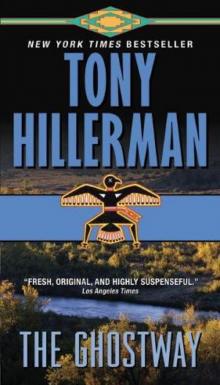 The Ghostway jlajc-6
The Ghostway jlajc-6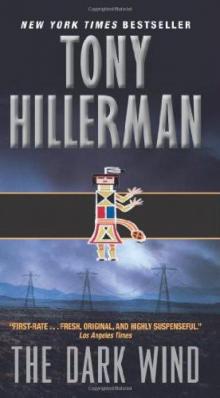 The Dark Wind jlajc-5
The Dark Wind jlajc-5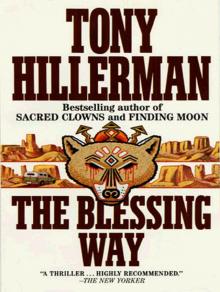 The Blessing Way
The Blessing Way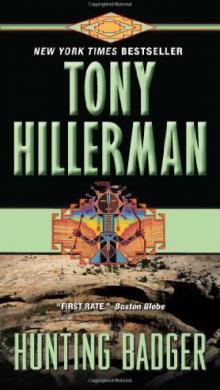 Hunting Badger jlajc-14
Hunting Badger jlajc-14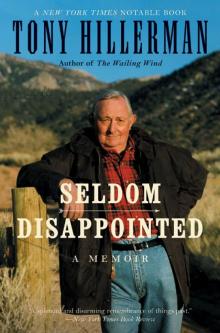 Seldom Disappointed: A Memoir
Seldom Disappointed: A Memoir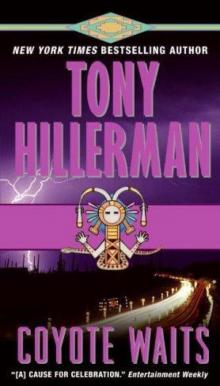 Coyote Waits jlajc-10
Coyote Waits jlajc-10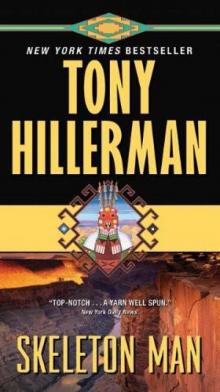 Skeleton Man jlajc-17
Skeleton Man jlajc-17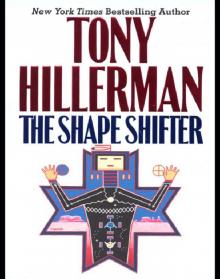 The Shape Shifter
The Shape Shifter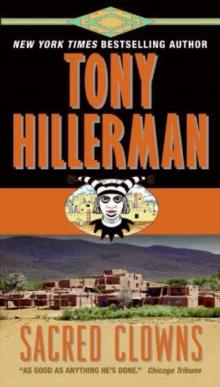 Sacred Clowns jlajc-11
Sacred Clowns jlajc-11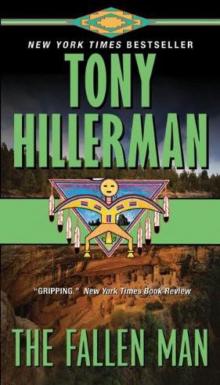 The Fallen Man jlajc-12
The Fallen Man jlajc-12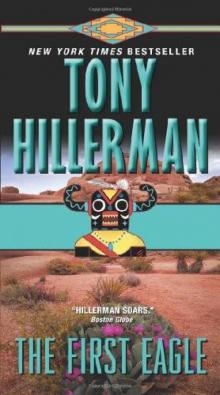 The First Eagle jlajc-13
The First Eagle jlajc-13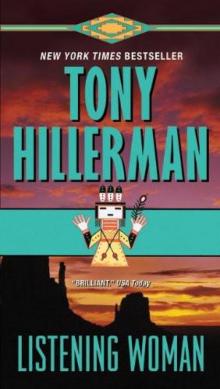 Listening Woman jlajc-3
Listening Woman jlajc-3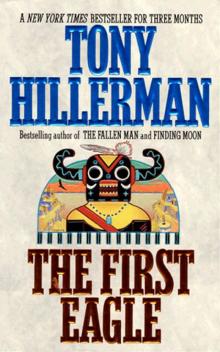 The First Eagle
The First Eagle Skeleton Man
Skeleton Man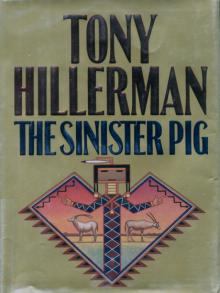 The Sinister Pig jlajc-16
The Sinister Pig jlajc-16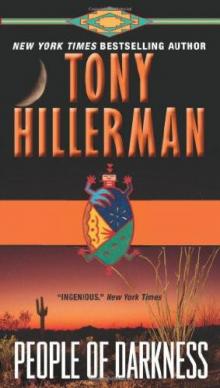 People of Darkness jlajc-4
People of Darkness jlajc-4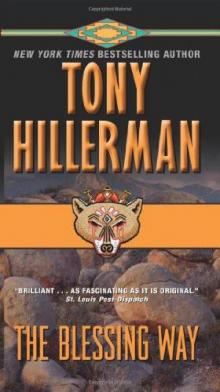 The Blessing Way jlajc-1
The Blessing Way jlajc-1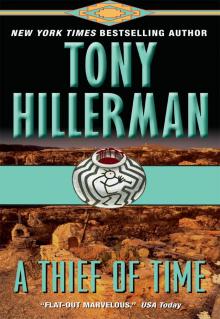 A Thief of Time
A Thief of Time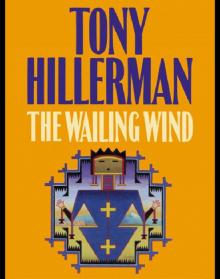 The Wailing Wind
The Wailing Wind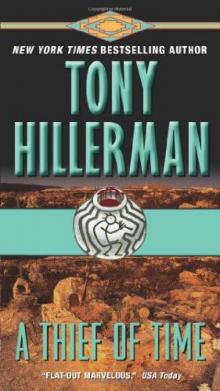 A Thief of Time jlajc-8
A Thief of Time jlajc-8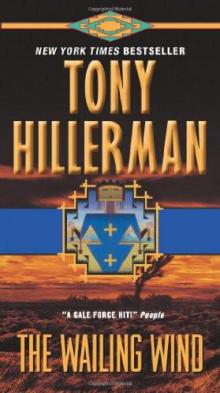 The Wailing Wind jlajc-15
The Wailing Wind jlajc-15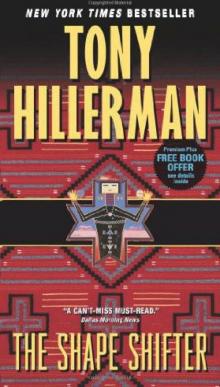 The Shape Shifter jlajc-18
The Shape Shifter jlajc-18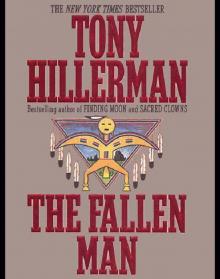 The Fallen Man
The Fallen Man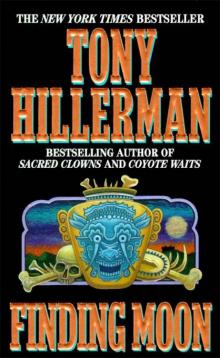 Finding Moon
Finding Moon